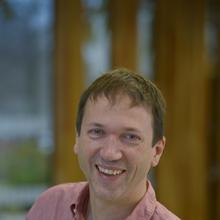PhD Studentship: Bacterial Biofilm Formation:Structural Studies on Diguanylate Cyclases [CLOSED]
Supervisors:
Dr Ivo Tews, Ivo.Tews@soton.ac.uk
Dr Jeremy Webb, Jeremy.Webb@soton.ac.uk
Prof. Bill Keevil, C.W.Keevil@soton.ac.uk
Bacteria can switch from a planktonic (free-living) lifestyle to a sessile, biofilm mode of growth. In biofilms, bacteria are less sensitive towards antibiotics and can evade the host immune response. Consequently biofilms are responsible for many types of persistent infection. Understanding the mechanism by which bacteria switch to the biofilm mode of growth is an important focus for infection research with much emphasis on molecular targets for the therapeutic inhibition of biofilm formation.
The second messenger cyclic diguanylate monophosphate (c-di-GMP) is a critical regulator of this bacterial differentiation. We investigate diguanylate cyclases that produce c-di-GMP in the human pathogen Pseudomonas aeruginosa. The bacterium is responsible for many biofilm-associated diseases, including chronic respiratory infection in cystic fibrosis patients. Our aim is to understand the regulation of this differentiation process by combination of in vivo studies with x-ray crystallographic 3D structure elucidation of diguanylate cyclases.
Methodology and Workplace.
You will use biofilm culture and analysis (e.g. flow cell reactors, confocal laser scanning microscopy, antimicrobial susceptibility testing), molecular biology and biochemistry techniques (cloning and mutagenesis, recombinant protein expression and protein purification). Protein crystallization will be carried out at the newly established automated facilities at the Institute for Life Sciences. The x-ray diffraction experiments will be carried out at the x-ray sources of the National Crystallography Service at the School of Chemistry and at the Diamond Light Source. Structure determination, 3D model building and structure analysis use scientific computing.
The Life Sciences building provides a multidisciplinary, stimulating and supportive environment for post-graduate students. As part of your research programme you will gain subject-specific and generic skills through attendance of training courses and seminars. In parallel you will have regular supervision sessions and you will also be involved in some undergraduate student supervision as you progress. You will be encouraged to present your findings at internal and external meetings and to contribute to the writing of papers for publication.
Funding Notes.
This studentship is fully funded, covering University tuition fees (at UK /EU level) and provides a tax-free bursary of £13,590 per year, rising annually in line with the UK Government (Research Councils) recommended rate, for a three-year duration. This opportunity is only open to UK nationals (or EU students who have been resident in the UK for 3+ years) due to restrictions imposed by the funding body.
Requirements: Equivalent of a first or upper second-class degree in biological sciences, biochemistry, or chemical sciences.
Application Deadline: February 24th 2011
Interview Date: March 14th/16th 2011
Start Date: October 1st 2011
